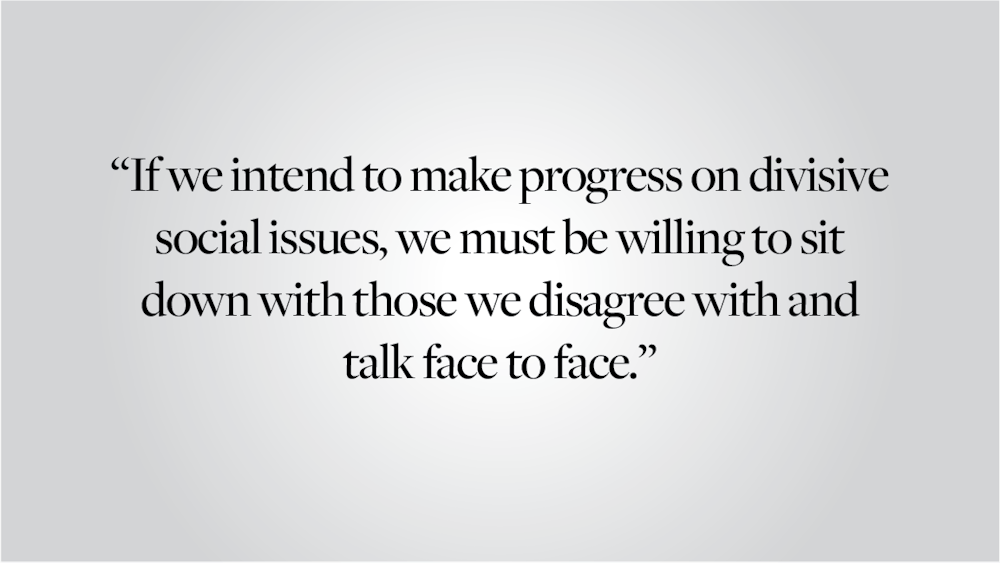With every cycle of disaster, social media explodes with polarizing political content. Instagram becomes a battleground on which individuals are flooded with infographics — some that accurately reflect whatever issues they mean to tackle and some that entirely miss the mark. Many individuals repost or respond to this content, contributing to the rapid spread of questionable information or engaging in conversations that barely scrape the surface of complex social issues. Outrage then builds on itself as communities become discontent with this flawed dialogue. Social media is not an adequate arena for sensitive political discussion; if we intend to make progress on divisive social issues, we must be willing to sit down with those we disagree with and talk face to face.
When using Instagram and other social media platforms as a place to address social issues, we disregard the fundamental human element inherent to politics. It becomes easy to view an online adversary as just another icon on a screen instead of a real person. We aren’t able to recognize that their deep convictions and different perspectives stem from lived experiences. Face-to-face, our ability to understand unfamiliar perspectives is aided by instinctive human empathy; online, social media interferes with this vulnerable process. Social media thus prevents us from understanding those we disagree with, impeding lived experience and perspective from being a part of the conversation. As long as we hide behind our screens, there is little room for the human component of these extremely human issues.
Online political debate, which is inherently impersonal, also often allows users to intentionally dehumanize their ideological opponents. Dehumanizing language — for example, equating certain human populations to “animals” — further incites feelings of division and creates hierarchies of respect, enabling and encouraging violence. In online discourse, where popularity and virality are crucial metrics for success, this kind of emotional manipulation becomes incentivized at the cost of less captivating logical appeals. These obstacles make having rational conversations about social issues online nearly impossible even as their value is recognized and acted on in person.
Social media also oversimplifies complex political discussions through means of aesthetically pleasing infographics. These graphics oversimplify the nuances of political conflicts, condensing dynamic ideas into a few slides. Because it is easily digestible, the data displayed in these infographics can be readily believed by Instagram users despite the fact that they lack valuable context. Unlike explanations or evidence delivered in person, online infographics have little potential for nuance, fueling the views of those who agree with them and agitating those who don’t.
Instagram infographics also contribute to the overload of information spewing from social media, ultimately polarizing communities more than they facilitate vulnerable dialogue and inciting conversations that are often counterproductive. Infographics containing fake news and exaggerated claims are more easily disseminated across social media — a study from the Massachusetts Institute of Technology found that “falsehoods are 70% more likely to be retweeted on Twitter than the truth.” As misinformation permeates more feeds, these posts become not only divisive but malignant. Individuals become more and more comfortable buying into information that they encounter online if it aligns with their views, regardless of its source. Rabbit holes turn into echo chambers, opinions turn into ideologies and discourse turns into disconnection. When misinformation hinders us from agreeing on the facts of a contentious issue, we are barred from even beginning to understand opposing perspectives, pushing genuine dialogue even further out of the picture.
This doesn’t mean that there are no ways to use social media for political engagement. Politicians have begun using social media to provide transparency to their constituents and mobilize voters. Foreign causes that would not usually receive coverage by Western media can use social media to spread awareness — even using platforms such as Facebook to procure aid. However, in moments of political crisis, our time is better spent delving deeply into relevant subjects face-to-face than repetitively consuming surface-level information online.
We must not only be conscious of how our perception of the world is being altered by social media, but we must reject it as a substitute for in-person political discourse. It’s important to engage in dialogue that humanizes those you disagree with, and this can only happen in person. At Brown, we have many student groups dedicated to some form of politics, culture, religion or social action. Rather than confronting political issues on social media, go talk to the informed individuals around you. Ask questions that might challenge both you and them. Make room for unfamiliar perspectives and welcome the extremely human component of human conflict. Hiding behind a screen has become overwhelmingly appealing, but we must push ourselves to engage in a debate that has genuine potential for progress — this means conversing in real life, not online.
Paul Hudes ’27 can be reached at paul_hudes@brown.edu. Please send responses to this opinion to letters@browndailyherald.com and other op-eds to opinions@browndailyherald.com.
Paul Hudes is a staff columnist and a member of the editorial page board for the Brown Daily Herald. His column is wide-ranging but focuses mostly on American politics. Paul studies Applied Math Economics and English Literature.





